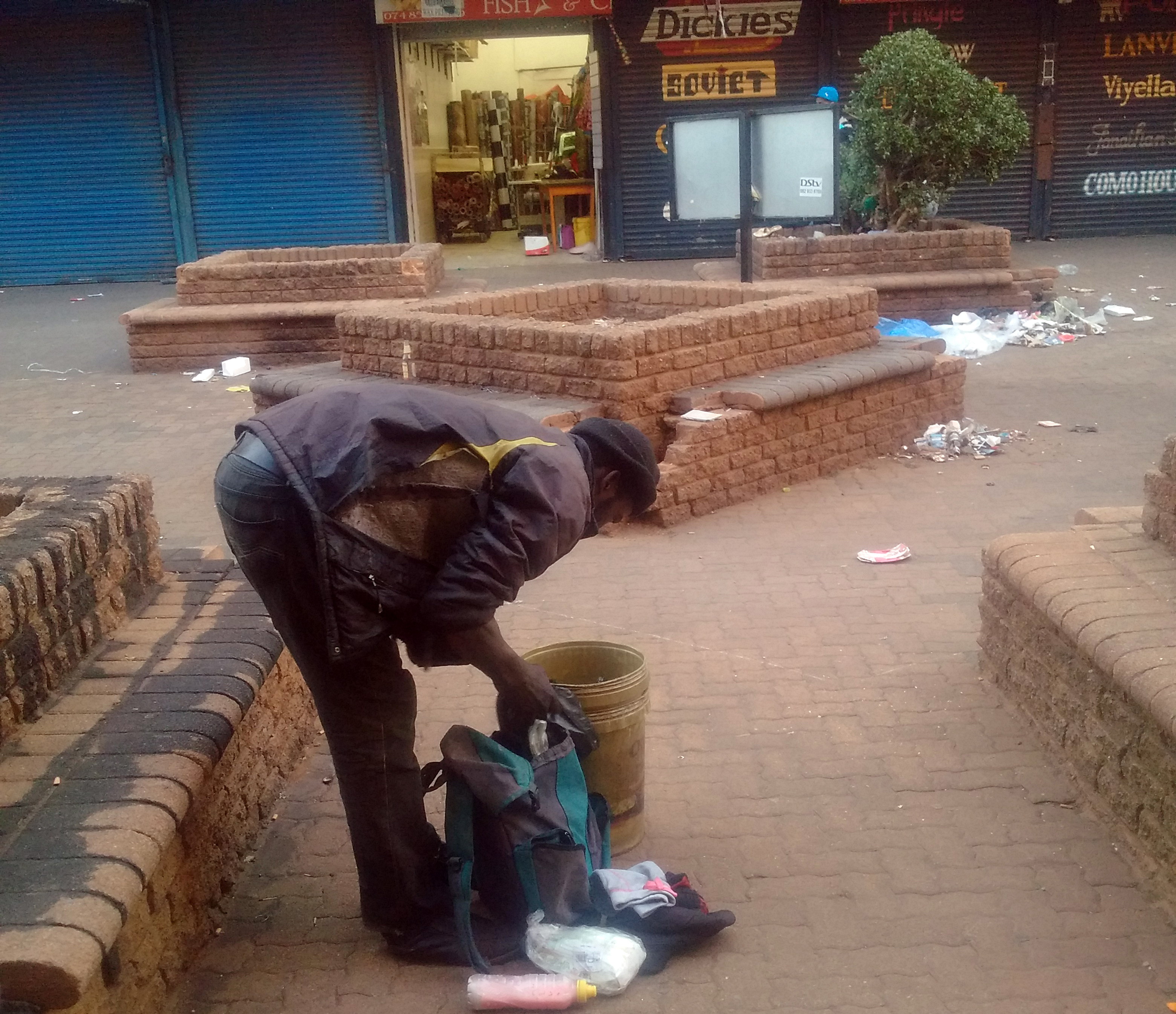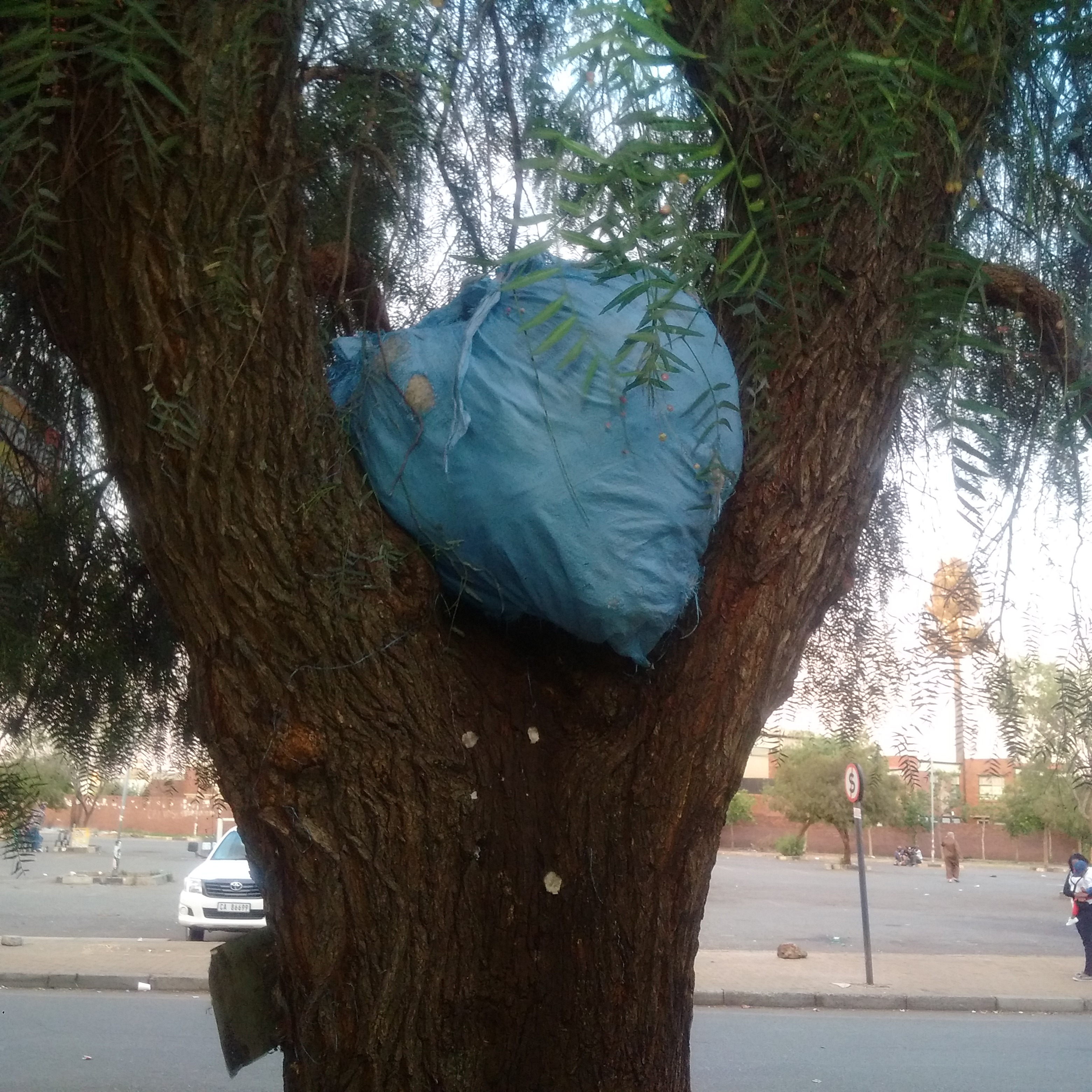From when he was a young boy, 33-year-old Bongani Mdlalose dreamed of getting himself a comfortable job which would enable him to take care of his family. However, after becoming unemployed four years ago, Mdlalose and his family are imprisoned by poverty in Lenasia in the South of Johannesburg.

Bongani Mdlalose, an unemployed and homeless man, prepares for bedtime on Wednesday in Lenasia. Photo: Bheki Simelane
Mdlalose, his 25-year-old girlfriend Lebogang Modise and 22-month-old baby Nonhlanhla Mdlalose sleep in between two trees near the Lenasia Taxi Rank. The homeless and drug addicts hustle by day and spend the night huddled in a veranda of one of the shops not far from the Lenasia Post Office.
Mdlalose’s toddler has already endured winter having to sleep without a roof over her head with her parents. Mdlalose points to a tree a few metres from their sleeping place on which he keeps his family’s belongings, mainly clothes, in between two boughs.
“Our belongings are safe here during the day. A guy who mends shoes keeps an eye on them while I hustle during the day,” Mdlalose said.
Mdlalose left home in Ennerdale four years ago after a fall out with his older brother, the only family member he said he has. Since then he has been staying in the streets of Lenasia where he met his partner. Mdlalose’s mother died in 2000. He never knew his father but his mother had told him that he was intentionally fatally run over after an argument.
“This is no place to raise a baby but there is no home to return to. This is home now,” said Mdlalose.
Like millions of other unemployed people in the country, Mdlalose comforts himself by hoping that one day things will get better. He does not know how a jobs summit could bring about jobs and is sceptical because “our leaders make lots of promises that they constantly fail to keep”.

Bongani Mdlalose stashes his family belongings in a tree during the day. Mdlalose has been unemployed for the past four years. Photo Bheki Simelane
He is among the 38% unemployed in the country, according to Statistics SA.
Thabiso Mokoena, 31, dropped out of school in Grade 11. He is from Edenside in Sebokeng on the Vaal. His mother is a domestic worker. He begs to survive, especially when his piece jobs are hard to come by.
Mokoena thinks there isn’t much the country’s leaders are doing to create jobs. He is not happy that decades after the end of apartheid many South African mothers, especially those from the townships, still rely on domestic work as their main source of income.
“This simply means there is no hope for us. I think they are just looking for votes because the elections re not far off,” Mokoena said.
When asked what he understands about a jobs summit and what outcome he was hoping for, Mokoena said the country’s leaders had failed dismally to create jobs.
“I don’t know what a jobs summit is. Our leaders have failed to create jobs and would rather talk about them. I don’t see how this will benefit people who are unemployed,” said Mokoena.
According to figures released by the World Bank, South Africa has the highest inequality in the world. Apart from the fact that 9.5-million South Africans are jobless, more than half the country lives below the national poverty line and most of the nation’s wealth remains in the hands of a small elite.
Some organisations are questioning the effectiveness of the Jobs Summit. The South African Federation of Trade Unions (SAFTU) has snubbed the gathering, saying they were not invited during the preliminary negotiations. Some South Africans are cynical, saying the government does not have a solid plan for the creation of sustainable jobs.
Others fear that the current jobs plan might involve the introduction of more temporary unsustainable employment. Some question how, if the government cannot prevent the shedding of jobs in various sectors of the country’s economic activity, it can create new jobs.
A statement released by the National Economic Development and Labour Council, Nedlac said President Cyril Ramaphosa emphasised that the Jobs Summit would be distinct from previous summits or workshops in that it would involve all social partners in determining and implementing solutions.
“President Ramaphosa said he was encouraged by the unity of purpose and collaboration among social partners to confront the greatest challenge facing our country,” said the statement.
Nedlac added: “The Jobs Summit Presidential Committee is resolute that this Jobs summit must be a major step towards jointly addressing the triple challenges of unemployment, poverty and inequality with its interventions directed primarily to assist youth, women, and low-income families and communities.”
The World Bank report further indicated that South Africa had scored terribly on all of the various ways to look at economic inequality in the country. The World Bank report further found that the top 1% of South Africans own 70.9% of the nation’s total wealth. The bottom 60% of South Africans control only 7 % of the country’s assets combined.
The jobs summit comes at time when the cost of living has risen sharply with fuel increases, food costs and other commodities biting deeper into the pockets of South Africans. The country is battling to avert a full-blown recession.
Soweto resident Anderson Mathebula, 27, is a skilled artisan who thinks the jobs summit will yield positive results, It is the kind of intervention the country needs to move away from the economic abyss, he said.
“My only concern is that even if the summit becomes a success in terms of providing sustainable employment, government programmes are not driven vigorously and wide enough to be accessible to all South Africans.
“I’m confident in the summit but its resolutions must be made accessible to even the people in rural areas, not just in areas situated in suburbs and towns. The gathering should benefit all South Africans,” he said.
But Mdlalose is sceptical. “How many jobs can President Ramaphosa create in two days, which the ANC failed to do in decades?” DM



















 Become an Insider
Become an Insider